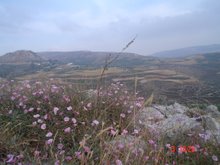I am still in Balata camp, doing my research from here for the week because of my need to finish some business in the camp. I am working on a documentary for my senior thesis and have been taking video of the homes that were used like a labyrinth by the Israeli army during the April 2002 invasion. Afraid to enter the camp's streets and allys, the army would instead weave its way through people's homes by blowing holes in the walls, making sure to mark with spray painted arrows the direction for the next group of soldiers to follow. People's walls are covered with these black arrows. (See http://www.hebdenbridge.co.uk/news/news04/images/b1.jpg for a picture.) Many have left them there as evidence for people like me to document. And document I do.
The work with PASSIA is going well. I will be back in the office next Monday, but for now the stay in Balata is quite relaxing and I am able to get quite a bit of work done for them here. It seems strange to talk about Balata using words like 'relaxing'.
And indeed, one of the most troubling aspects of 'quiet' periods here in occupied Palestine is the deceptive nature of the relative calm; even I---after reading so much about the tragic history of this land and the misery of the refugees, after experiencing first and second hand the daily humiliations and stoppages caused by occupation---am sometimes fooled into thinking that things are getting better. This is precisely the problem. The international newsmedia has moved on to bigger and better things. The intifada is over. There are no more bombings in '48 territory, very few acts of resistance. So the press ignores the people living under occupation.
People are tired. And so there is talk of 'disengagement', of a new chance for 'peace'.
Unfortunately, Oslo has once again reared its ugly head. Palestinians then had their rights stripped from them by a relative foreigner---the corrupt, money hungry and out of touch Arafat. During Oslo negotiations, an American diplomat happily remarked that the Palestinians were by far the 'most flexible partner' involved. This flexibility essentially meant the final dagger in the heart of the dreams naively harbored by Palestinians during the first intifada. Most people in 1987, at the beginning of the first uprising, thought the Israelis would give up, cower under the hail of stones and give them a state within a year at most.
Now people here, after the crushing blow dealt to them through Oslo and their first intifada's miserable defeat, and then struggling for almost four years to resist the 'normalization of occupation', are relieved to have a bit of breathing room. What is this breathing room? It is a shorter line at the checkpoint (or no line at all); it is more permits granted so that Palestinian fathers and brothers may whore themselves more freely to Israeli contractors for criminally low pay; it is a few hundred of almost ten thousand prisoners released---a drop in the bucket but no small feat for the families of the imprisoned.
Unfortunately, these small gains obscure the larger problem: as Palestinians became tired of the struggle---the constant invasions, the permanent state of siege, the poverty, the joblessness, the murders, deportations, tortures and indiscriminant arrest campaigns---they resigned themselves to forgo the only measure of political power they once posessed. This is, simply, violence.
Now, without this bargaining chip, or rather this reminder to the world of their existence and of their plight, the Israeli public and the international community are disconnected from the still harsh reality of life under occupation. Few mention the continued Israeli theft of over 80 percent of the West Bank's water---which is then sold back to the Palestinians at insane prices and rationed so heavily that many people here in Balata run out every week before the truck comes to deliver the next week's supply. Few mention the continued expansion of the settlements, which strangle and make claustrophobic the Palestinians living within what was once---as Palestinian national poet Mahmud Darwish called it---a veritable paradise.
No one wants to talk about the notorious Israeli prisons: inside, about 8,000 Palestinians---men, women and children---languish in the most horrifying conditions, enduring physical and psychological torture, separation from their families and paranoia due to Israeli efforts at forcing collaboration. Most of the people in these prisons are there for participating in 'political activity', which means, according to Israel, that they oppose the Israeli occupation and have done or said something to prove it. Many of them are imprisoned without charge, enduring what Israel euphemistically terms 'administrative detention'---a highly anti-democratic means of sending someone to prison for a renewable sentence of 6 months without evidence, charge or trial.
Here in Balata things are quiet. I have not in my five days here seen one army jeep or heard one shot from an Israeli gun. But people here are no less adament about the nature of the occupation and its effects on their daily lives. People are still criminally poor, their services neglected, their movement and freedoms dreadfully absent, their mothers, sisters, fathers and brothers still behind bars. And so people, gaining strength and energy for what may come next, anxiously predict the next uprising. The third intifada, I have been told, will shock the world. If only the world were shocked by what goes on today, there would be no need for another round.
Tuesday, June 07, 2005
Subscribe to:
Post Comments (Atom)


No comments:
Post a Comment